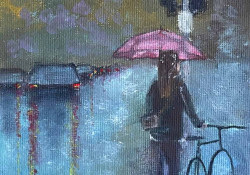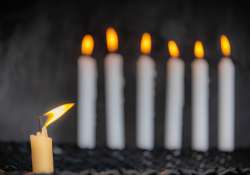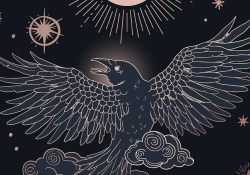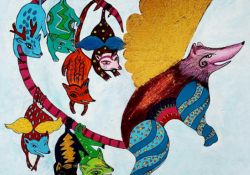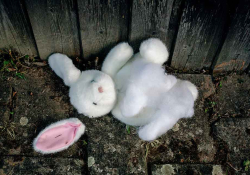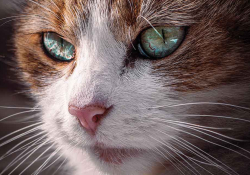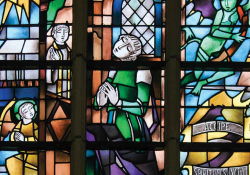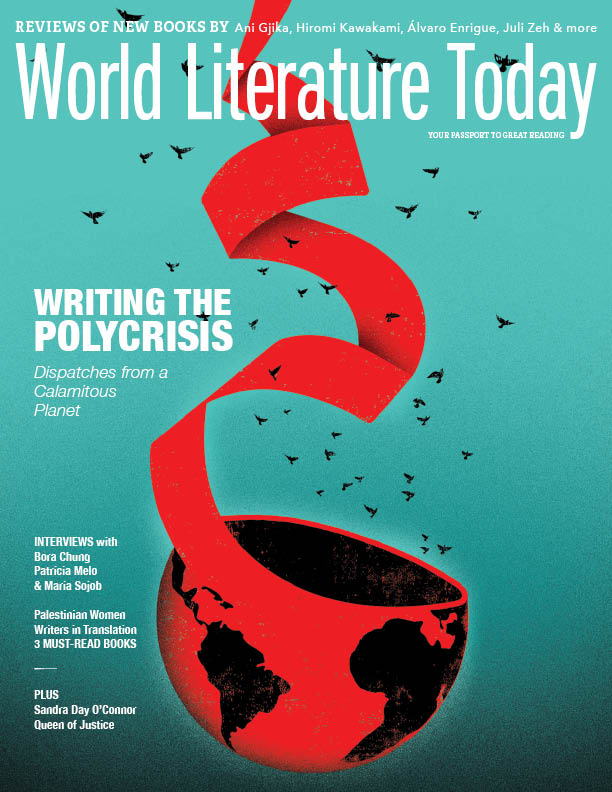The Wayward Children of Asase Yaa
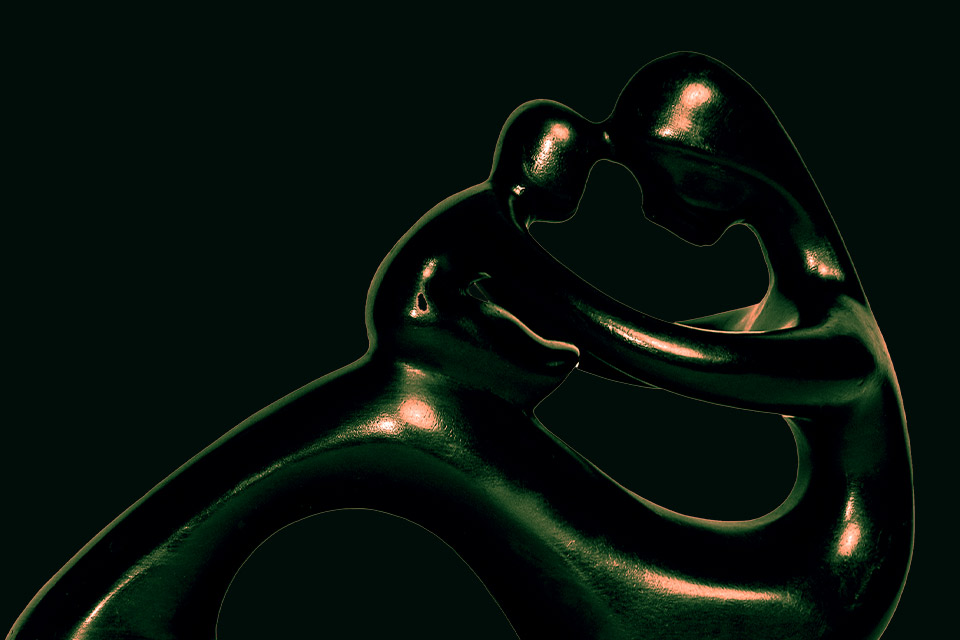
The offspring’s appetites know no end. What’s a mother, any mother—even that mother who nurtures us all—to do?
The wound is smaller than last time, tiny teeth marks ringing the circumference. It started as a dull ache drawing her out of her dreams; a vague, colorless sensation. Now that she’s conscious, the ache has blossomed into pain, red and real and raging.
Asase Yaa curls her knee into her belly so she can reach the wound. Her middle finger sinks into the bloody hollow and she bites back a gasp.
It only takes a cursory glance around her to find the culprit. One of her babies. When she finds him, her heart can’t help but soften. There are telltale flecks of blood on his jaw, and yet she is moved by the reckless way he slumbers, limbs sprawled with abandon. She reaches out with her uninjured leg and nudges him into a fetal position.
Rising, she checks on the other children—still snoring, except the older ones who didn’t come home, little rebels—and then hurries to clean up before they wake. She places a fresh poultice over the new wound and wears her cloth loose around her so it rides low on her hips, the hem covering her ankles and the wounds.
The shift in seasons warns her of the approaching festival, another glittering get-together where all the mothers in the cosmos commune and commiserate. She fantasizes about skipping it, but she has no choice. Governed by the same laws as the other mothers, pulled in the same direction, around the same sun, she goes where the orbit takes her.
The festivals never bothered her before. There was a time when she relished the drumming and dancing, the colorful camaraderie, the steady flow of wine and wisdom. But now she feels the eyes of the other mothers on her like shivers, barbed words hooking into her skin. She is tired of wounds, and less tolerant of harm inflicted by those she didn’t give life to.
She arrives at the festival on schedule, dressed as cautiously as she could manage, but the mothers have eyes like daggers that cut right through her disguise.
“Are you thinner, Asase Yaa?”
She forces a smile. “The pattern on my dress is slimming.”
“Nonsense! A mother must be luscious. You dwindle each time we glimpse you.”
“You have lost your glow.”
“Did she ever glow, really?”
“Come, don’t be nasty. All mothers glow.”
“Well, technically . . .”
She places both hands over the small bulge that holds her next brood and tries without success to keep her desperate gaze from the gloried, glistening bellies of the others. Their pregnancies form flawless arcs beneath silky dresses strewn with stars, lending a richness to their cheeks and a thickness to their hair. Their moons trail them like lovestruck suitors, while hers judges her in cold, white silence. They are lush, those other mothers, swollen with the promise of devoted, dutiful, disciplined life. Their children are not like hers. Their children are . . . good.
“Look at the hollows in those collarbones! Like they were scooped out with a spoon!”
“No hips to speak of . . .”
“Such dry skin . . .”
“Is that another injury on your leg?”
Scandalized gasps.
“And you continue to allow it? This shameless abuse?”
She keeps her smile on and throws in a tinkling little laugh for good measure. “Calm, my sisters. All is well. We ebb and flow, you know that.”
They look at her with wily eyes that see through her defenses, and whisper behind their rings.
“Her own children. Can you imagine?”
“Wicked creatures.”
“She lets them run wild, that’s the problem. Children need boundaries.”
“Children should care for their mothers. We give them life, they grow strong and tend to us. What sinister beings could fail to grasp this?”
“She should punish them. Teach them respect.”
“How? Don’t you see how weak she has become?”
“Keh! Me, I can’t even look at her.”
“If I birthed demons, I’d drown them all.”
She waits an agonizing eon for the cycle to draw her away from them and back to blessed solitude. For days afterward, she hears their words ringing in her ears: If I birthed demons, I’d drown them all.
* * *
The children are awake and hungry. Always hungry. They descend upon her, suckling until her breasts give no more milk, until her very essence rises into their gaping maws.
“Don’t be greedy,” she chides them, and they bite down, regardless.
She loves them. She loves them and loathes them, and the conflict will damn her, if it hasn’t already.
In the night, when they are asleep, she drags herself to the edge of the abyss and gazes into nothingness. She feels the hunger of the unborn brood already. It gnaws at her, a riot in her womb. They tear at the walls, impatient to be out, to live and walk and feed like their brethren.
“Don’t be greedy,” she chides them, and they nibble away.
She feels the hunger of the unborn brood already. It gnaws at her, a riot in her womb.
* * *
Weeks before the next festival, Asase Yaa rises earlier than usual and creeps away from the children. She has many wounds to tend to, scrapes and gashes and gouges.
The children are never sated, no matter what she does. What flaw has made her produce young with such voracious appetites when her milk is finite? Her children are all need, all fierce desire, but they are hers and they are perfect, so the fault must be hers. She is not enough. She must be harder on them, teach them to behave, but how, when they never listen?
She sobs into the darkness with passion she didn’t know she could still summon, tearless, racking sobs, because the children have drunk her dry.
“Mother, don’t cry.”
At first she thinks she has imagined the voice. She’s losing her wits now, and the other mothers will shake their heads and pretend to sympathize while they laugh at her torment behind plump, healthy hands.
“Mother, don’t cry.”
She opens her eyes. “Go away, you’re not real.”
“Of course I’m real.”
She searches the shadows for the owner of the voice and finds one of her children standing nearby, watching her.
“What are you doing here?” she asks.
“I came to tell you that you don’t need to worry anymore. I have solved the problem. No more hunger.”
She’s too tired to make sense of his babbling. “Why aren’t you asleep with the others? You should go back. You need your rest.”
It is then that she sees the blood on his feet, and his hands, and splattered across his chest. Her stomach clenches with fear.
“What did you do, child?”
He smiles.
“What did you do?”
“I killed the others. All of them.”
She starts to keen.
The child looks confused by her reaction. “Don’t cry, Mother. I had to do it to save you. Everything will be well, you’ll see. You’re free now.”
“No, you don’t understand. That’s not the way . . .”
But before she can say more, he leaps into the abyss and is gone.
* * *
She finds the bodies of the other children close to their sleeping place, piled high like firewood. It’s a day and a half before she can find the strength to bury them.
* * *
She births the next brood three days later. They come out fighting and wailing and ravenous. They feed and feed, too young to understand that her milk shouldn’t taste so sour and her blood shouldn’t run black as tar. She knows she is ill. She knows her illness will spread to them. But no matter how hard she tries to push them away or ration their intake, they refuse to stop. They climb over her face and shoulders, locking limbs with each other in their furious need.
For hours there is no sound but their suckling, as though the universe paused to listen and has been shocked into permanent silence.
“Don’t be greedy,” she chides the children, and they lick their little fingers.
* * *
She stumbles into the next festival, head reeling, stars dancing before her eyes. Her dress is torn and bloodstained, her head and feet bare. She has made no effort to hide the wounds this time. What would be the point?
She reaches for a drink and the glass slips from her hands, shattering into pieces on the pristine floor. The other mothers scream in horror and refuse to speak to her, and she is too weary to care.
* * *
When Asase Yaa wakes in the morning, all her children are dead. The ground is littered with their tiny, bloated bodies, and the soil beneath them has reddened with their blood. She throws herself on top of the little corpses and tears at her hair, weeping until she is worn out with despair. She falls into a deep hibernation, her battered body desperate for rest, waiting to see whether it will ever be fertile again.
* * *
It takes time, but the poison leaves her. She becomes lush like the others once more. When her belly swells with life, she is rich and ripe and beautiful, and at the next festival the other mothers eye her with envy.
“It won’t last. You know what your children are like.”
“Enjoy this brief respite. As soon as they come out . . .”
“But you do look lovely tonight. I love your dress!”
“Did your eyes always sparkle like that? It’s been so long since you were healthy, I don’t remember . . .”
Their pettiness can’t touch her. “It will be different this time,” she tells them. “This brood is not the same. I can sustain them. I am more than enough.”
“Yes, but that’s what you said before.”
“And before that.”
“Maybe you should consider . . . you know . . .”
“You should. It’s the sane course of action.”
“Better to be safe.”
There’s an awkward silence. She bites her lip, hurt, but too proud to let them see it. “I’m birthing my babies. Every last one.”
They sweep away, shrugging plump, rounded shoulders.
“Each mother to her own.”
“A shame, though.”
“Don’t say we didn’t warn you.”
* * *
Her new brood is beautifully formed, small and healthy and fierce. There are thousands upon thousands of them, every last one hungry.
She is bursting with milk, producing more than the children can hope to drink. And because they see abundance they grow cruel and careless. Before she knows it the children have children and they, too, have children, and her milk is still flowing, but it’s not as rich as it used to be, and she starts to feel the strain.
“Feed me, my children,” she begs them, “so I can make more milk. If I sicken, so do you. Take care of me so I can keep you alive.”
They promise to do so, but run off laughing and get caught up in the wonders of existence, and forget.
A marvel, really, how they forget to feed her and yet always remember to feed themselves, how they manage to be so clever and yet so dull.
A marvel, really, how they forget to feed her and yet always remember to feed themselves, how they manage to be so clever and yet so dull. A vile thought—she flings it away, afraid it will taint her love for them, but the thought only slinks into the shadows and multiplies, and when she’s asleep it creeps back inside her with its young and they replicate until her mind is a hive of resentment.
When she wakes, her body is all pain. She looks down at her spindly arms, her bite-dotted thighs, her protruding ribs. She knows she won’t last much longer. Then she feels a gnawing ache in her womb and realizes that she is pregnant again.
* * *
Asase Yaa births her last brood. They emerge ravenous, descending upon her with their older siblings in a flurry of licking tongues and tiny teeth. They don’t realize she is dead until their own bodies begin to fall, writhing on the ground and then dissolving into dust.
At the next festival, the other mothers pour libation in Asase Yaa’s honor.
“Such a pity!” they murmur.
“A tragedy, indeed.”
Her ghost wanders the star-seeded sky, keening.
Accra, Ghana

